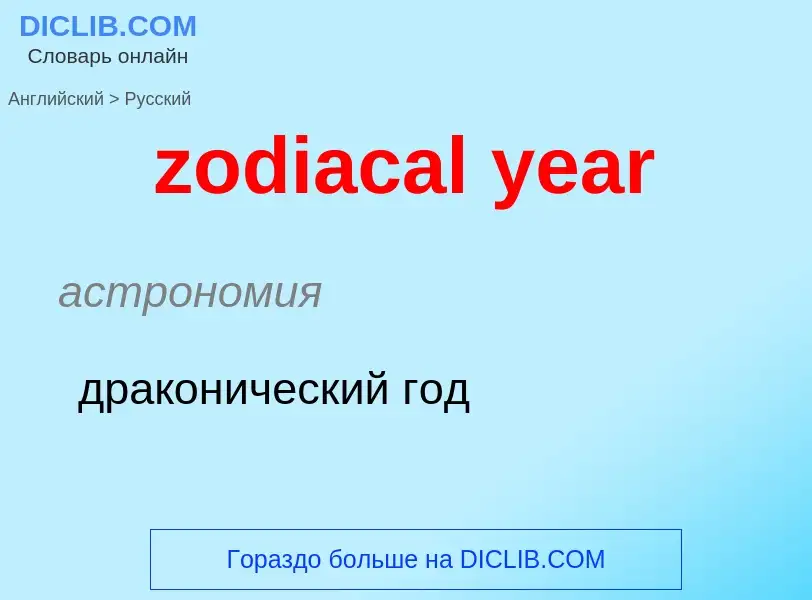Translation and analysis of words by ChatGPT artificial intelligence
On this page you can get a detailed analysis of a word or phrase, produced by the best artificial intelligence technology to date:
- how the word is used
- frequency of use
- it is used more often in oral or written speech
- word translation options
- usage examples (several phrases with translation)
- etymology
zodiacal year - translation to russian
астрономия
драконический год
финансы
налоговый [фискальный] год (условный год, начало и конец которого определяются законодательно для целей налогообложения, т. е. 12-месячный период, за который предоставляется налоговая декларация и уплачивается подоходный налог или налог на прибыль; обычно не совпадает с календарным годом (напр., в Великобритании налоговый год начинается 6 апреля, а в СШа - 1 июля))
синоним
Смотрите также
Definition
Wikipedia
The zodiacal light (also called false dawn when seen before sunrise) is a faint glow of diffuse sunlight scattered by interplanetary dust. Brighter around the Sun, it appears in a particularly dark night sky to extend from the Sun's direction in a roughly triangular shape along the zodiac, and appears with less intensity and visibility along the whole ecliptic as the zodiacal band. Zodiacal light spans the entire sky and contributes to the natural light of a clear and moonless night sky. A related phenomenon is gegenschein (or counterglow), sunlight backscattered from the interplanetary dust, appearing directly opposite to the Sun as a faint but slightly brighter oval glow.
Zodiacal light is very faint, often outshined and rendered invisible by moonlight or light pollution.
The interplanetary dust in the Solar System forms a thick, pancake-shaped cloud called the zodiacal cloud which straddles the ecliptic plane. The particle sizes range from 10 to 300 micrometres, implying masses from one nanogram to tens of micrograms.
The Pioneer 10 and Helios spacecraft observations in the 1970s revealed zodiacal light to be scattered by the interplanetary dust cloud in the Solar System. Analysis of images of impact debris from the Juno spacecraft shows that the distribution of the dust extends from Earth's orbit to the 4:1 orbital resonance with Jupiter at 2.06 AU, and suggests that the dust is from Mars. However, no other dedicated dust instrumentation on Pioneer 10, Pioneer 11, Galileo, Ulysses, and Cassini found an indication that Mars is a significant source of dust besides comets and asteroids.

![Zodiacal light viewed from the Moon, during [[Apollo 15]] Zodiacal light viewed from the Moon, during [[Apollo 15]]](https://commons.wikimedia.org/wiki/Special:FilePath/AS15-98-13325.jpg?width=200)
![access-date=14 February 2017}}</ref> [[gegenschein]] and the rest of the zodiacal band of light, which is visually crossed by the [[Milky Way]]. access-date=14 February 2017}}</ref> [[gegenschein]] and the rest of the zodiacal band of light, which is visually crossed by the [[Milky Way]].](https://commons.wikimedia.org/wiki/Special:FilePath/False Dawn.jpg?width=200)


![Zodiacal light seen behind the [[Submillimeter Array]] from the summit of [[Mauna Kea]] Zodiacal light seen behind the [[Submillimeter Array]] from the summit of [[Mauna Kea]]](https://commons.wikimedia.org/wiki/Special:FilePath/Submillimeter Array Night.jpg?width=200)
![First ever panorama image of the dust ring of Venus's orbital space, imaged by [[Parker Solar Probe]]. First ever panorama image of the dust ring of Venus's orbital space, imaged by [[Parker Solar Probe]].](https://commons.wikimedia.org/wiki/Special:FilePath/Venus dust ring.png?width=200)
![Zodiacal light seen from [[Cerro Paranal]] Zodiacal light seen from [[Cerro Paranal]]](https://commons.wikimedia.org/wiki/Special:FilePath/Zodiacal Light Seen from Paranal.jpg?width=200)


